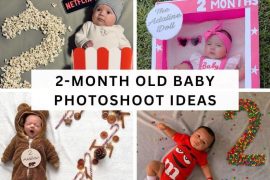Disclaimer: There are affiliate links in this post. At no cost to you, I get commissions for purchases made through these links.
When your little angel comes into this world, family members or relatives always want to show their affection to him. Kissing is the most common way grandparents use to greet, welcome, and show deep love to their little grandchild.
On the other hand, kissing an infant might be dangerous if they are unknowingly carrying a disease. You shouldn’t let your beloved ones kiss your baby under any circumstance to protect his health from potential illness.
So, how to tell them not to kiss your baby politely? It’s time to refer to the following suggestions to politely tell your relatives not to kiss your little one without offending them. Let’s get started.
Why You Shouldn’t Kiss Newborns
It’s hard to resist kissing sweet, soft infant cheeks, but you should avoid letting your relatives do so for many reasons. Besides parents, the love of other family members is an essential aspect of every baby’s development.
On the other hand, failure to take measures may be highly detrimental to your newborn. Kissing a newborn can result in the following issues:
- Respiratory syncytial virus: It’s a dangerous and potentially deadly infection that spreads by personal contact or contaminated respiratory droplets spread through coughing or sneezing.
- Immune system deficiency: Infants’ immune systems are still growing, so they need to work extra hard to protect their little bodies from succumbing to sickness and infection.
- Fever blisters: Many people get cold sores, so all should be cautious when kissing a newborn.
- Allergic reactions: A kiss from your family members who have beauty products or food particles on their lips can trigger food allergies in newborns.
- Hand, foot, and mouth disease: Hand, foot, and mouth disease can happen to anybody, but it’s more frequent in kids under 10.
Smart Ways to Tell Grandparents Not to Kiss Your Baby
Here are the most effective ways to tell grandma or anyone else to stop kissing your baby but not hurt their feelings.
1. Ask Politely
Ensure the grandparents understand why you don’t want them to kiss their grandchild. Tell them that this is not irresponsible behavior or unwillingness to care for your newborn.
They might be infected with illnesses like the herpes virus but be unaware of it.
They might well be unhappy at first. However, if asked in a caring and gentle manner, your beloved ones will be sympathetic.
They will realize that it isn’t personal if you make the hazards of kissing a newborn clear. Also, remember to show them that it’s the rule for all.
For examples:
1. It’s so nice that you love the baby so much and would like to be a good grandmother. But, please don’t kiss her all the time.
2. Grandma, don’t kiss the baby. I know you love her, but this is not good for her. It is very unhealthy.
3. Granny, I want you to please stop kissing the baby’s face. I know it’s just your way of loving her, but I feel it makes her uncomfortable.
4. Grandma, we appreciate your love and affection, but please respect our wishes to keep baby’s kisses for us.
5. Oh Grandma, I’m sure you understand – baby kisses are best saved for Mommy and Daddy!
6. Grandma, thanks for wanting to give our little one a kiss – we’ll have to save it for next time.
7. Grandma, I’m sure baby loves your kisses but let’s keep them for another day.
8. Oh Grandma, don’t worry about kissing baby today. there will be plenty of time for that later.
9. Grandma, we love your kisses, but let’s save them for when our little one is older.
10. I know you want to give baby lots of love, Grandma, but kisses are best for later.
11. We don’t want to overload baby with too much love – no kisses until later.
12. As much as we’d love your smooches, let’s save them for when baby can appreciate them.
13. Grandma, you’re so sweet – why not give baby a hug instead of a kiss?
14. Let’s keep those kisses stored up for when baby can return the favour.
15. We can show our love with snuggles instead of smooches.
16. The baby looks so sweet, so let’s just blow him a kiss instead.
2. Show Grandparents The Facts
Give your baby’s grandparents some reading material if they assume you’re being overly sensitive. Several papers are available to provide evidence from physicians and other reliable sources.
Follow the guidelines and inform them about how kissing might make your baby sick. Although it is uncommon for a baby to get a severe infection like HSV-1, you should still take measures.
If you’re scared about offending your parents, give them the trusted scientific findings, so they understand you’re not exaggerating. Assure them that it’s only temporary till your baby is more developed and their protective system is more solid.
They have to wait a few months. After that hard time, they can freely kiss your little child with confidence.
3. Before Your Baby’s Birth, Talk To Them About It
It’s unlikely that you’ll be able to discuss it once your parents come to the hospital. Given the risks associated with kissing a baby, it’s understandable if you want to keep people as far away from your newborn as possible.
You should have this conversation with your family members and grandparents as soon as possible before your baby is born. If they become agitated, you’ll have time to calm them down before they visit your baby.
It will also allow you to review some additional rules at home.
It will also give them enough time to go through it all with you, ask questions, and be actually in agreement before your child arrives.
If you provide any articles with them, they’ll give them more time to study the material and assess the hazards.
4. Do Not Become Irritated
Even if some people think you are overly protective of your child and causing a ruckus, try to be firm but not get irritated when talking about it.
Assure your child’s grandparents that the no-kissing rule extends to everyone in your newborn’s surroundings, not only family members.
Because most risks are not readily apparent, you can persuade them that prevention is preferable to cure.
5. Set Out Rules If Grandparents Get Ill
Even if grandparents are in good health, they should not kiss him when he is born. Something as simple as a cold may be catastrophic to a baby. So, tell them they should complete a health check before coming to your house.
You may need to establish some rules for once they get ill in any scenario. They will need to wait to see your newborn until they are well enough if they get any illness symptoms.
Regardless of how upset they are, you should prevent them from kissing him due to potential health issues.
6. Inform Them That It’s A Doctor’s Order
If you’re afraid about your grandparents being upset, tell them it’s the doctor’s orders. If your family or in-laws learn about the health risks from you, they might not believe it’s an actual threat.
They must, however, consider your requests if the Pediatrician has already said that they are essential. You may even consult a Pediatrician about it before making you feel more comfortable having a family conversation.
It’s better to speak with your doctor about the risks and ways to keep your child healthy.

When Can Grandparents Kiss A Baby?
An infant’s immune system will not be wholly established for some time. It’s especially crucial to be cautious of infections in the first 6 weeks.
To strengthen his immune system, your infant will also have to be subjected to pathogens as he grows older. However, because your infant’s immune systems are still developing, the neonatal stage would not be the best time.
When your newborn is roughly three months old, his immune system develops. Therefore, it’s possible that your grandparents can kiss your little one after that time. Your child should be appropriately vaccinated and have a well-established immune system.
When people aren’t feeling well, it’s still necessary to tell them about the health potential issues of kissing an infant and stop them from kissing your child. It’s preferable to delay and have them drop by when they are completely healthy, even if they get a common cold.
What To Do If Someone Kisses Your Baby?
The immune system of a newborn does not establish until 2 to 3 months of age. As a result, it’s essential to assist your baby in fighting infections. When someone kisses your newborn, it’s vital to take the required measures.
Maintaining Personal Hygiene for Newborns and Parents
Parents are frequently preoccupied with caring for their children that they neglect themselves. Personal hygiene is just as vital for parents as keeping a newborn healthy and hygienic.
Follow the guidelines below:
- Before kissing or hugging your newborn, wash your face and hands.
- After coughing, blowing your nose, or sneezing, wash your hands.
- Give them a good scrub with hand sanitizer for 20 seconds when washing your hands.
- Make regular dental visits and practice proper oral hygiene.
- If other children play in your house, take additional precautions while allowing them to play with or kiss your infant.
Vaccinating Your Newborn
Most kissing-related illnesses are curable and not life-threatening. Within the next few days, your infant’s immune system will be able to fight against the disease.
Furthermore, several vaccinations may aid in developing your child’s immune system or the prevention of most of these diseases.
Maintain regular contact with your child’s doctor and adhere to the immunization schedule.
Within The First Few Weeks, Avoid Meeting Guests and Going Out
While everyone desires to see your new baby, it’s acceptable to avoid visits in the first several weeks. However, because you will most likely have guests, it’s a good idea to establish specific health regulations for them, as shown below:
- Before hugging or kissing your infant, visitors must wash their hands first.
- People who are getting illnesses should wait to see a child until they are healthy.
- If anyone has a record of respiratory problems, they should avoid kissing the newborn.
Keep An Eye Out for Early Symptoms
While some symptoms might resemble a regular cold, others could require medical treatment. When your child shows poor appetite, excessive crying, irregular stools, respiratory distress, vomiting, or fatigue, you should pay close attention to him.
Wrapping Up
After reading this article, we hope you find an acceptable way to tell grandma or family members not to kiss your baby. In short, it’s not too hard to stop them from giving kisses to your child without hurting them.
You can ask them politely, show them the facts, set rules when to kiss your newborn, have some conversations before your child is born, or tell them it’s doctor’s orders.
As long as you are gentle and calm, they will feel sympathetic with you. Hopefully, this post will be helpful for you.




